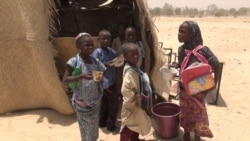The coronavirus pandemic has caused more than half a million deaths so far in its sweep around the world. What isn't included in this figure is the impact on the health of mothers and children who don't have the virus but are suffering.
For a real-life example of this situation, go to Nairobi at night during the government-imposed curfew.
There, a woman is in labor. If she doesn't get to a hospital, she will give birth at home without a midwife.
“Every time I went to the hospital,” Dr. Jemimah Kariuki, an obstetrician-gynecologist at Nairobi’s Kenyatta Hospital told Reuters News Service, “[there were] more complications … and when women died alone in childbirth, I was like ‘in 2020?’ You are dying? Alone?”
Kariuki helped start a free ambulance service so women could get to the hospital and improve the likelihood that they and their babies would survive.
What's happening in Nairobi is happening worldwide. Because of the coronavirus pandemic, health care and social services for women and children have been cut by 20%, according to a U.N. report.
“Health systems in both rich and poor nations are massively struggling and the services for mothers, newborns, young children and adolescents are crumbling,” said Dr. Elizabeth Mason, co-chair of the U.N. Secretary-General’s Independent Accountability Panel that produced the report. Mason was quoted in a news release from the U.N.
Dr. Nicholas Alipui, another panelist, told VOA that children younger than 5 are especially at risk.
"Initial estimates are projecting that we will see a major impact on under-5 mortality rates, mortality rates for newborns, for maternal mortality,” Alipui said. “The numbers of malnourished children, children who are exposed to abuse and violence, critical loss of access to women's health, etc., so, the estimates are quite dire."
The numbers speak for themselves. The report estimates that nearly 400 million children who depend on meals at school are going hungry because schools are closed. And 13 million children are missing vaccinations. Some parents are afraid to take their children to get their shots for fear of catching the virus, and some countries have a shortage of vaccines.
Alipui says that if this continues, global outbreaks of preventable disease are likely.
"The risk of a new and renewed outbreak of measles, polio and all these other infectious diseases, is actually real, and it's something that we need to be prepared for," Alipui said.
The report also finds that women and girls worldwide are experiencing higher rates of abuse, increased pregnancies and reduced access to reproductive services. The U.N. report estimates that the disruption to contraceptive supplies will result in 15 million unintended pregnancies in low- and middle-income countries.
“We are at a point where decades of progress for this group could be easily reversed,” said Joy Phumaphi, co-chair of the panel and former WHO assistant director general, in a U.N. news release. Since 2000, deaths of mothers and children younger than 5 have been cut by 40%, because of focused leadership and investment, even in the poorest nations.
Alipui says rich nations must realize everyone is affected and come to the aid of the poor because the devastating consequences of COVID-19 won't end with a vaccine.







